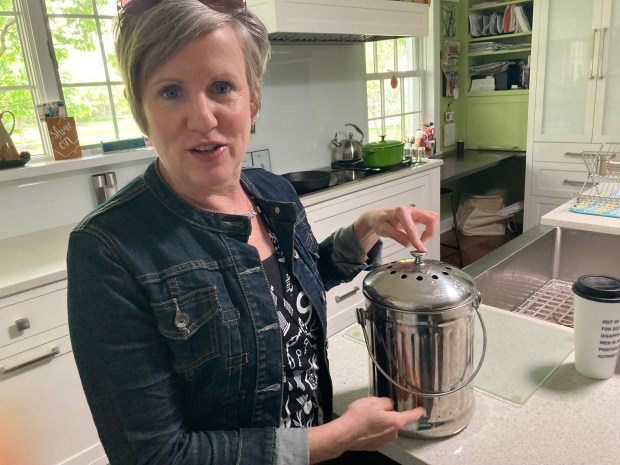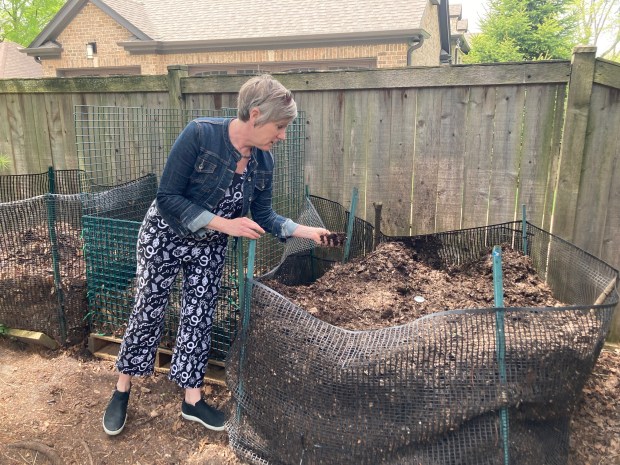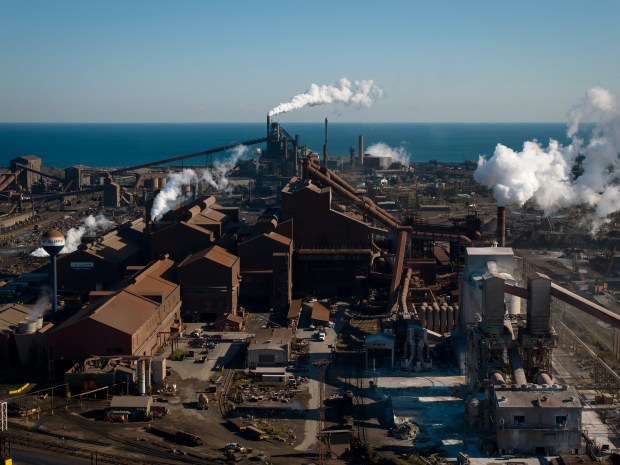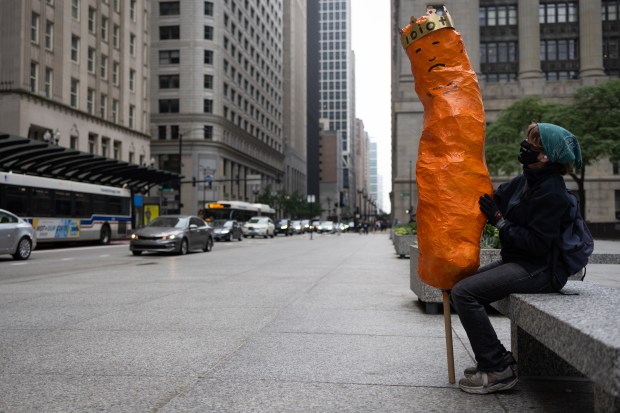Conventional wisdom says people should tackle one environmental cause at a time — say, food waste, plastic reduction or pesticide avoidance — lest they get overwhelmed and abandon the course.
For Amy Bartucci, that doesn’t work.
“People say, ‘Just pick one thing,’” said Bartucci, of Park Ridge. “And I say, ‘I understand what you’re recommending, but I just can’t.’ I was born this way. I just don’t slow down.”
In recognition of her years-long and multifaceted environmental activism, Bartucci was conferred the 2024 Sgt. Karen Lader Memorial Good Citizen Award recently at the annual meeting of the Maine Township board of trustees.
“This was a no-brainer,” Township Clerk Pete Gialamas said in a news release.
“Amy Bartucci is doing all she can to make a difference in Maine Township and the surrounding communities and her passion clearly shows through her work.”
Bartucci works part-time for the nonprofit Illinois Food Scrap & Composting Coalition and for the Village Farmstand community grocery store in Evanston.
Her many endeavors include founding Go Green Park Ridge in 2012, a year after her family bought a home in town. The group has partnered with local high schools for yearly cleanup days in nearby forest preserves, and has persuaded the Park Ridge Park District to stop using pesticides in parks and on school
grounds.
As an advocate with the Chicago Metro chapter of the Climate Reality Project, Bartucci serves on the steering committee of the Coalition for Plastic Reduction, which wants to ban plastic bags and polystyrene foam (commonly known as Styrofoam). The Coalition was among advocates of Illinois’ State Entities Single-Use Plastic Reporting Act, which bans state agencies from purchasing polystyrene foam food ware in state facilities and agencies starting Jan. 1, 2025, and doing business with vendors who distribute polystyrene foam food ware to customers starting Jan. 1, 2026.
Bartucci also serves on the board of the Illinois Stewardship Alliance and is involved in initiatives to operate community refrigerators in Evanston and elsewhere.
Her family — husband Marcello and children Francesco, 26, Elyse, 23, Macala, 21, and Rocco, 19 — is “hugely supportive” of her activism, she said. Everyone participates in striving to be a near zero-waste household by composting, growing vegetables, packing waste-free lunches and avoiding plastics, she said.
Bartucci grew up in Chicago’s Morgan Park neighborhood and first learned about food systems from her uncle, Paul Schultz, who owned an organic farm in Lawrence, Michigan.
“He was my mentor, and it really made an impression on me,” she said.
She met her husband at DePaul University, where she studied elementary education with a concentration in environmental studies. She taught for four years, then pivoted to volunteerism and community service after having children.
Her environmental efforts ramped up about 15 years ago, when she co-organized an effort to rectify the “throwaway culture” at her children’s school, which didn’t have a recycling program, she said. When she went back to work, her first job was installing vegetable gardens through The Organic Gardener.
The COVID-19 pandemic prompted Bartucci to reevaluate her work as a program manager for a nonprofit and start thinking about her true purpose, she said. “I decided to redesign and really craft my own job and how I want to spend my day,” she said. “Now, it’s a hybrid of work and volunteer work.”
The pandemic highlighted the brokenness of the food system, which leads to both food waste and food security issues, she said. “In Illinois, to feed a family, we have a very large percentage of food imported into the state. When the pandemic caused supply-chain issues, we had a lot of hungry people who were not able to feed themselves.”
Fixing the food system is central to finding solutions to the climate crisis, as well as promoting human health, she said. One simple way to help that is trying to only buy seasonal fruits and vegetables, she added.

“I am a soil health nerd,” she said. “Everything about our soil needs to be resilient and regenerative, but our food system has not been equipping our communities to thrive on the power it has in the soil. Our soils have been disturbed, disrupted, eroded, chemically treated and under-acknowledged as the climate
solution. I always say, ‘The soil will save us.’”
So how much hope does Bartucci have for the environment?
“I am very realistic in saying, ‘I am going to do this until the day I die,’” she said.
“And the role I have seems to make it natural for me to push out climate anxiety, somehow miraculously. I consider these wicked problems, but I don’t think they are unsolvable. I just don’t know how much I will get to see in my lifetime. But it definitely does not make me work any less.”
“I have to look at my family,” she added, “and hope they are going to have a better future than what exists right now.”





